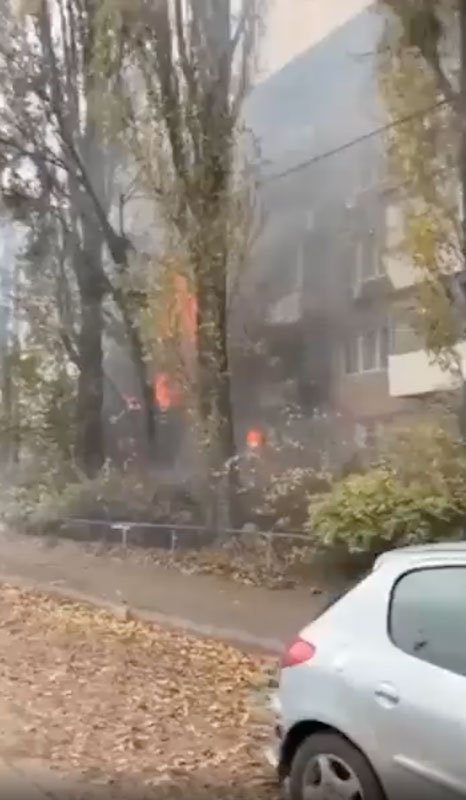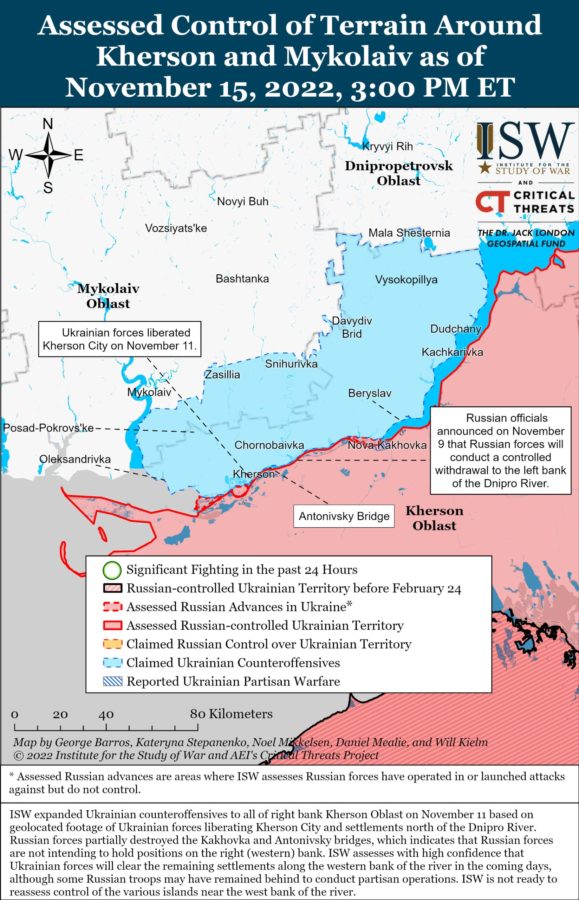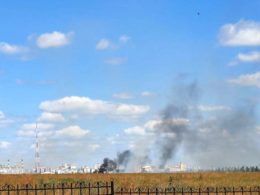Russian forces conducted the largest set of missile strikes against Ukrainian critical infrastructure since the start of the war. Ukrainian Air Force Command spokesperson Yuriy Ihnat reported on November 15 that Russian forces launched about 100 Kh-101 and Kh-555 cruise missiles at targets in Ukraine, primarily against Ukrainian critical infrastructure facilities. The Ukrainian General Staff also reported that Russian forces targeted Ukrainian infrastructure with ten drones. Ukrainian and Russian sources reported
that Russian forces struck targets in Kyiv as well as in Rivne, Zhytomyr, Lviv, Khmelnytskyi, Dnipropetrovsk, Poltava, Vinnytsia, Odesa, Kirovohrad, Cherkasy, Volyn, and Kharkiv oblasts.
The Russian military likely used a substantial portion of its remaining high-precision weapon systems in the coordinated missile strikes on November 15. The Ukrainian General Staff reported that Ukrainian air defenses shot down 73 Russian cruise missiles and all drones on November 15. Ukrainian air defenses had previously shot down 43 cruise missiles out of 84 and 13 drones out of 24 during the October 10 coordinated Russian missile strikes. Ukraine‘s increased shoot-down percentage illustrates the improvement in Ukrainian air defenses in the last month, and the Ukrainian General Staff attributed this improvement to the effectiveness of Western-provided air defense systems.
Nov 15 attack on Ukraine: Russia launched “over 90” missiles, Ukraine downed 77 – GenStaff
ISW also assesses that Russian forces are greatly depleting their stock of high-precision weapons systems and will likely have to slow the pace of their campaign against critical Ukrainian infrastructure. Russian missile strikes continue to pose a threat to the Ukrainian civilian population with Ukrainian Deputy Head of the Presidential Office Kyrylo Tymoshenko stating
that the energy situation is rather “critical” in Ukraine. Damage to Ukraine’s energy infrastructure is unlikely to break Ukrainians’ spirit, however, given Ukraine’s improving air defenses and recent ground victories in Kherson Oblast.
Polish officials announced that a likely “Russian-made missile” landed in Poland within six kilometers of the international border with Ukraine. Western officials have yet to make definitive statements regarding the incident. The Polish Foreign Ministry stated on November 15 that a “Russian-made missile” killed two Polish citizens in the border village of Przewodow. Polish President Andrzej Duda noted that Poland does not currently have information regarding the actor responsible for firing the missile but noted that the missile was “most probably Russian-made.”
The Russian Ministry of Defense (MoD) denied Russia’s involvement in striking any targets near the Ukraine-Polish border and claimed that the incident is a “provocation.” Russian forces, however, did target energy infrastructure in Lviv City, about 72km south of Przewodow.
US President Joe Biden stated
that according to preliminary information it is unlikely that the missile was fired from territorial Russia but emphasized that the investigation is still ongoing as of the time of this publication. Ukrainian President Volodymyr Zelenskyy accused Russia of staging a “serious provocation” on NATO territory. ISW will continue to monitor the situation.
The Kremlin had prepared the November 15 massive missile campaign before Ukrainian President Volodymyr Zelenskyy presented his 10-point peace proposal at the G20 summit on November 15. Zelensky reiterated that Ukraine will negotiate with Russia if the Kremlin totally withdraws its forces from Ukraine, restores Ukraine’s territorial integrity, and ensures punishment for war crimes among other provisions on nuclear, energy, and food security.
The Russian pro-war community on Telegram claimed that the Kremlin retaliated for Zelensky’s “Russophobic” statements shortly after his speech, but the impossibility of launching such a massive attack on short notice highlights the Kremlin’s disinterest in setting the stage for negotiations with Ukraine.The Kremlin likely deliberately planned a massive missile strike campaign on Ukraine in anticipation of Zelensky’s speech at the G20 summit given that a multi-direction missile campaign requires significant military preparation.






